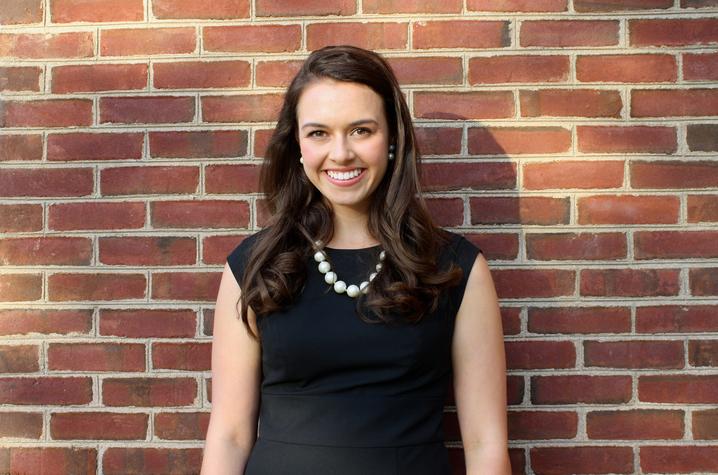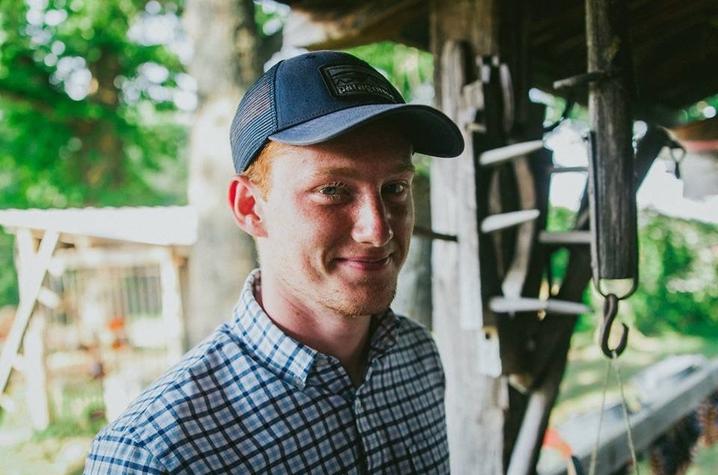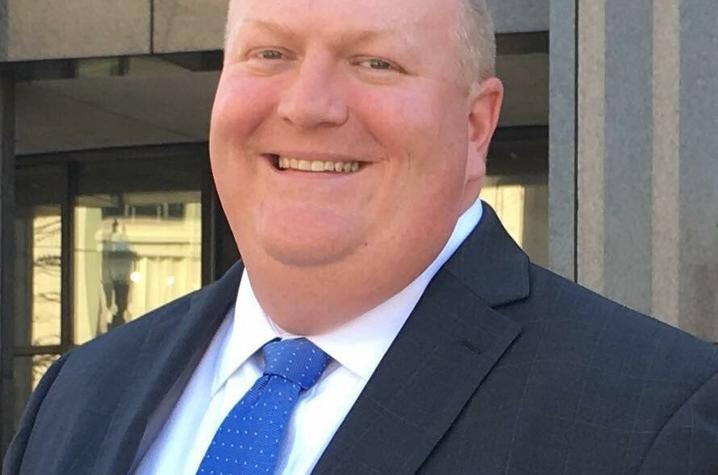2017 Sullivan Award Winners Change Lives Through Public Health, Nonprofits, STEM Tutoring and Assisting the Homeless
LEXINGTON, Ky. (April 19, 2017) —The 2017 winners of the Sullivan Medallion, the highest award the University of Kentucky presents for humanitarian efforts, have changed lives through a public health art project, a nonprofit volunteer effort, a science education outreach program for at-risk children and a deep concern for the plight of the homeless.
The awards were presented in a ceremony last night at the Boone Center, part of the 90th anniversary of UK's relationship with the Algernon Sydney Sullivan Foundation, a charitable organization formed by the New York legislature in 1930 with the mission of promoting "the welfare of mankind."
The 2017 senior woman award winner is Kaylee Hicks, a native of Versailles, Kentucky, and an international studies major on the pre-medical track. As a Singletary Scholar, a Gaines Fellow, a Chellgren Student Fellow and an Honors student, she studies the intersections between public health, clinical treatment, and community capital in underserved populations.
"She is a model servant-leader whose actions manifest the 'spirit of love for helpfulness to other men and women' that this award honors," said Lisa Broome, associate director of the Gaines Center for the Humanities.
Hicks served as a Baptist Church missionary in Ica, Peru, in the summer of 2014, and she taught children at an orphanage in Mexico in the summer of 2015 while serving as a translator for health professionals teaching CPR in a Mexican town, Naco, on the border with Bisbee, Arizona. She did an unpaid public health internship with the Naco Wellness Initiative while she conducted research to inform future health promotion activities.
As a Gaines Fellow, for her jury project, Hicks proposed and developed the Naco-Bisbee Mural Project, combining public health research and community engagement. The project created and installed murals to encourage healthy practices, including washing hands and eating fruits and vegetables. It involved artists, town officials, public health researchers and townspeople, including children. She raised funds for the project from the Clinton Global Initiative and other sources.
In summer 2016, she traveled with a team of volunteers with the Emmaus Project to Guatemala, Belize, Honduras and El Salvador to support low-income churches providing maintenance, health services and financial resources. She and her team provided maintenance work for local clinics, schools, and churches and hosted day camps for children.
Hicks has demonstrated a long record of public service since she was a freshman volunteering at the Ashland Avenue Baptist Church's International Student and Refugee Thanksgiving Dinner. She has served meals at the Hope Center and the Lexington Rescue Mission, and she was a youth retreat small group leader at two churches, transporting middle school girls to Bible study.
On campus, she has served as a tutor, a UK Student Government Association New Student Liaison, and a member of the Student Health Advisory Council.
She is a volunteer reading to at-risk kindergartners in Lexington, and this summer she will volunteer at an English as a second language camp for adult learners in Chicago.
In the UK Honors Program, Hicks took a leadership role on a team developing an issue book for public deliberation and civic engagement to address public health concerns, and as a Chellgren Scholar, her project focused on health assessments and improvement plans.
As a Gaines Fellow, she recently successfully defended her senior thesis, titled “Racial Factors of Epidemic Response and Population Control in Peru, 1980-2000,” which was inspired by both her research interests and her travel experience in Latin America.
Hicks has been admitted to multiple regional medical schools and plans to pursue medical and master's of public health degrees after graduation.
She is deeply involved with her church and is motivated to serve others because of her faith. Ultimately, she plans to live abroad with her soon-to-be husband, using both clinical and preventive measures to help impoverished communities improve their health.
The 2017 senior man Sullivan Award winner is Kyle Hancock, a 2016 UK graduate with a bachelor's degree in public health. Hancock has begun his master's program at UK with concentrations in environmental health and epidemiology and a certificate in public health management.
He was inspired to pursue public health as a career in the summer after his freshman year on a trip to Haiti as a part of a medical team where he saw how public health could aid so many people. As hundreds of people poured into the makeshift clinic to receive medications, he realized that the benefits were temporary and that a systematic approach through public health was the answer to prevention of illness.
To achieve public health gains, Hancock began to explore the value of nonprofit organizations. He was accepted into the first cohort of students in UK's Certified Nonprofit Professional (CNP) Program, where he gained valuable skills in setting up, running, and maintaining an effective nonprofit organization.
He served in three internships with nonprofits, the first in February 2015 with Habitat for Humanity. Catherine Mitchell, ReStore volunteer coordinator for Lexington Habitat for Humanity, wrote that Hancock "took ownership of the roles given to him," including streamlining operations, collecting donations, working with the Deconstruction Department, and co-leading volunteer groups, and "quickly demonstrated mastery over each new role."
He next served as an intern for the CNP director, doing marketing and other organizational tasks to bring in more students and connect them to local nonprofits. His third experience was working at a Christian summer camp for youths called Crossings. His freshman year he served weekly as a volunteer at the Ronald McDonald House, cleaning the facilities for the families in need. He also served on the leadership board of the Big Blue Pantry, a food pantry on campus that serves needy students, collecting donations and managing volunteers in 2015 and 2016.
Hancock took a Spring Break service trip in March 2014 to Camden, New Jersey, to work with underprivileged children in an after-school program, furthering his desire to mentor kids in need. He worked as a high school youth group leader at a local church and a peer mentor. On campus, he served as an ambassador for the College of Public Health, a residential advisor, and teaching assistant at Presentation U.
Through his Chellgren Student Fellow undergraduate research on the effectiveness of an earthquake early warning system, Hancock aspired to help populations in low-income areas and with low education levels. In his graduate practicum at the Association of Air Pollution Control Agencies, he aims to improve the health of the general public, especially more vulnerable populations.
Hancock also interned with Buck Run Baptist Church from May to July 2016, editing videos for promotional purposes, serving lunch to construction workers working on a new church facility, operating a robotic camera and assisting teams and coaches for Upward soccer. He was a summer staff member and campus representative at Crossings Ministries from May 2014 to August 2015.
He was a Center Point Church High School youth leader from August 2015 to present, leading overnight trips to summer camp and winter retreats. He also served as a College of Public Health peer mentor and ambassador in 2015-16.
The 2017 citizen award co-winner is Cagney Coomer Felton, a UK doctoral student in molecular biology. She is the founder of Nerd Squad, an outreach organization "dedicated to inspiring the next great minds by bringing life to STEM activities."
"She has reached literally hundreds of kids, mostly kids of color and kids in poverty, with message that STEM is for them," said Tanya Torp, the 2016 Sullivan Award winner for citizen. "She hosts science fairs bringing hundreds of family members to show up for their kids where schools have failed to see that kind of parent participation."
Felton began her outreach, thanks to E7 Kids Café, an after-school program in the Lexington area that allowed her to bring science from her point of view to the children they served.
She expanded her impact with the Work Experience and Career Exploration Program (WECEP), and soon Nerd Squad blossomed to receive requests from across Kentucky. She partnered with the Tates Creek High School Step Team to fill a need for high school girls in Lexington. With the change, Nerd Squad transitioned from an organization dedicated solely to STEM education outreach to one also dedicated to generational empowerment.
"Starting with myself and the team of people supporting Nerd Squad and its vision, we made sure to provide positive role models and mentorship to the older ladies, holding ourselves accountable as we held them accountable for their actions," Felton said.
When William Wells Brown Elementary School received the lowest ranking for standardized test scores in Fayette County, Nerd Squad launched project-based learning in the science curriculum. It added two more partnerships with elementary schools in Fayette County, Booker T. Washington and Coventry Oaks.
Nerd Squad's tutoring program offers twice-a-week instruction to students in grades K-12 with a one-to-one ratio of students to tutors led by high schoolers. Tutors provide support for all subjects, including Spanish, physical activity, partnerships with other Lexington organizations and dinner each night. Nerd Squad also offers tutors College Learning Association certification upon the completion of tutor training.
"Kids literally jump for joy when talking about science when they encounter her," Torp said about Felton. "She is a dynamic go-getter."
The second 2017 citizen award winner is Charlie Lanter, director of Lexington’s Office of Homelessness Prevention and Intervention.
Lanter is known for his ability to connect heart and passion to policy, process and impact, according to civic activists and those in the mayor's office who work with him.
Over the past three years homelessness in Lexington has declined by almost 400 people, or 27 percent, and chronic homelessness is down more than 50 percent as a result of Lanter’s leadership and a systems approach to helping this vulnerable population.
Lanter was the founding director of Lexington’s Office of Homelessness Prevention and Intervention, serving from May 2014 through March 2017, when he was promoted in city government to director of grants and special programs.
Known as the “homeless czar,” the “homeless director,” and several other informal titles, his job was to pull more than two dozen area shelters, housing programs, government divisions, law enforcement, landlords and funding sources together to improve local outcomes regarding homelessness. In this role it was not uncommon to find Lanter meeting in Phoenix Park with a mentally ill man experiencing homelessness in the morning and meeting with the mayor in the afternoon.
In his role as director, Lanter oversaw the concept development and implementation for a Housing First Pilot Project that has housed dozens of chronically homeless individuals.
He used data to identify the need for a family shelter and then brought together necessary stakeholders to develop an innovative emergency shelter initiative for families that meets their needs in apartments instead of traditional shelter buildings.
He identified the need for a street outreach program and directed funding to this initiative and has supported creation and implementation of the Fayette County Mental Health Court.
Perhaps the most important developments under Lanter’s leadership have been implementation of the Lexington Coordinated Entry System for people experiencing homelessness. Previously, people experiencing homelessness bounced around from program to program, making calls or navigating bus routes while hoping to find one with an opening for which they might be eligible.
Often it was the person who called most often or pushed hardest who got into the precious few available program beds and not those who most needed the assistance. At best it was a first-come, first-served system that left the most vulnerable people outside looking in at a dwindling number of resources.
The solution to this challenge has been coordinated entry, which is a collaboration of all Lexington emergency shelters and housing providers that ensures each person experiencing homelessness – through shelters, street outreach, and United Way 2-1-1 calls – is assessed using a research-based tool that considers life, health and safety factors in prioritizing people for housing.
Lanter "has spent his life toiling for Lexington," says 2016 Sullivan citizen winner Tanya Torp, who called him "a mentor and an ally of mine."
"He goes above and beyond to connect citizens with resources and to advocate for what is right," she said.









